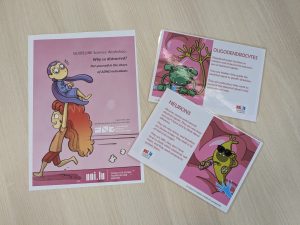Secondary school teachers and other interested people can now download guidelines for science workshops and activities around different topics.
In the context of the LUX:plorations project, several hands-on science workshops and activities have been developed to offer opportunities to further engage with the scientific topics covered in the comics. So far there were workshops about the immune system, the microbiome, brain organoids, attention deficit hyperactivity disorder (ADHD), but also about the use of artificial intelligence (AI) for object detection, how virtual reality (VR) influences our perception of time and how water is transported within plants. The workshops have been offered during several events and occasions, for instance at the Luxembourg Science Center or at different secondary schools in Luxembourg as complimentary material to the science comics.
“We wanted to make the resources we generated available to as many teachers as possible”, says Nicole Paschek, Project Manager of the Doctoral Education in Science Communication (DESCOM) at the University of Luxembourg. “That’s why we decided to publish scripts, guidelines and other materials online for free.”
On the dedicated resources webpage you can find cards describing key features of four different kinds of brain cells: neurons, oligodendrocytes, astrocytes and microglia. When distributing them among a group of students, the cards can be used to initiate a role-playing game that makes them better understand the roles of the single cells within the brain.
There is also a guideline to a workshop that puts participants in the shoes of people with attention deficit hyperactivity disorder (ADHD) to better understand their daily challenges. It could be used in biology classes to explain neurobiology from a different point of view and to show what can happen when neurotransmitters are out of balance. “But the workshop could also be used in activities making individuals aware of how they learn best or to find a more inclusive learning environment”, says Lydia Alegria, teacher at the Lycée Josy Barthel Mamer, who reviewed the guideline. “At our school we established a whispering room to give students the possibility to work without disturbances. This room is very appreciated by our pupils now.”
More resources to come
More resources and their translations into German and French are constantly being updated to the webpage that is work in progress. More activities are being developed each year. To not miss any updates, you can subscribe to this list.
Thanks to our partners: the Luxembourg National Research Fund (FNR), the Doctoral School in Humanities and Social Sciences (DSHSS), the Doctoral School in Science and Engineering (DSSE) as well as the Faculty of Science, Technology and Medicine (FSTM).
© University of Luxembourg
